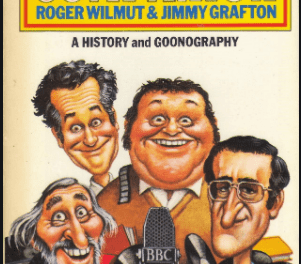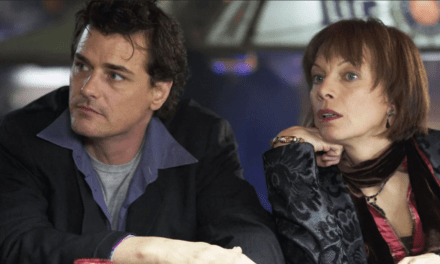Who says that hearing voices is a bad thing? As far as my television viewing habits go, I’ve been hearing them more frequently as of late, or, at least, I’ve been hearing those voice-overs that continue to characterize and add character to so many television shows. For example, I always know that Dexter’s on when I hear Michael C. Hall’s voice-over commentary, and, like the rest of the show’s audience, I have come to expect that Dexter will share his inner thoughts, reveal his gruesome secret intentions, and even crack a few good in-jokes about the goings-on from episode to episode through voice-over. As I mentioned in the introduction to Dexter: Investigating Cutting Edge Television, the voice-over narrative is an important part of the show’s unique take on the serial killer, inasmuch as it brings us right into his mind and “creates a degree of familiarity between Dexter and the viewer” (xv). It makes Dexter relatable and even sympathetic in ways that storyline and character development alone could never accomplish, particularly with a character of this nature. (“By listening,” EW’s James Hibberd says,” we “become his accomplice.”) It also, essentially, “others” all of the other characters on the show, because we cannot hear their thoughts or know what they are really all about. The series regulars who represent the humanity that he aspires to, like Batista, Quinn, Masuka, and his sister Deb, thus become as much of a mystery as the “big bads” that he hunts from season to season, like Miguel Prado, Trinity, and Travis Marshall.
But Dexter is not the only show that has made good use of voice-over or drawn viewers into its storylines through such narrative musings. Although he worked out of a novelist’s guest house in Hawaii, Thomas Magnum’s voice-over commentary on Magnum P.I. provided a noir-ish nod to the show’s place within the detective tradition. Kevin Arnold’s voice-over on The Wonder Years offered, both in tone and aspect, some adult perspective on the trials and tribulations of being a teen in America in the 60s and 70s. Mohinder Suresh’s voice-over on Heroes typically helped to tie the plot points of each episode to the larger thematic issues at work on the series, as did Carrie Bradshaw’s on Sex and the City. And Michael Westen continues to define what it means to be a “burned” spy through voice-over on Burn Notice. If there is something unique about these shows, then that uniqueness is tied as much to the voice of the character and the character of their voice as it is to the sets and the setting, the plotlines, the clothing, the production values, and the theme song.
In a 2010 Chicago Tribune piece, critic Julia Keller, on the strength of dramas like Dexter, Burn Notice, Grey’s Anatomy, and Desperate Housewives, went so far as to suggest that we have been living “in a Golden Age of Voice-Overs” because TV writers are now “us[ing them] with more artistry, eloquence and flair than ever before, to set moods and tones, to deepen and sharpen characterizations, to mystify and beguile as well as to explain and elucidate.” Looking at the network schedules last fall, in fact, Los Angeles Times writer T. L. Stanley concluded that even more new shows, like The Mindy Project and The Carrie Diaries, were joining the conversation and that, as serial television goes, voice-overs have “perhaps never been so abundant.” The Voice isn’t just a television show; it is becoming our viewing experience.
There could be various reasons for this outbreak of narrative chatter. TV shows, after all, can be notoriously imitative, so the success of voice-over on one or two shows might well lead to its adoption on four or five others. This “Golden Age,” then, could be the result of a stylistic “voice-over meme” working its way through the medium, one that will continue to reproduce and evolve (or exhaust itself) over time.
Voice-overs may also satisfy a cultural need for our televisions to talk to us or just to talk. At a time when people increasingly crave interactivity in their consumption of and engagement with mass media, they effectively break down that fourth wall and bring us into a place of narrative privilege, a one-on-one with our favorite characters in their own hours of conflict, turmoil, and need. We may not be able to live in their worlds, and the conversation may be one-sided, but we can have it nonetheless, all from the privacy of our own living rooms. We can, as Phil Collins once sang, almost “feel [them] like a friend.”
Since “social media outlets,” as Stanley points out, “broadcast plenty of the personal and private,” people have become more comfortable with and almost expect the unfiltered sharing of information, even from their fictional television heroes, and voice-over fulfills that expectation by giving viewers direct access to these minds at work. We don’t have to wait for a tweet; we can hear what they are thinking as they think it.
For all of the good that may come from them, though, many television shows still have resisted, rejected, or ignored the turn toward voice-over commentary, and, if the writing is strong and the drama is high, the lack of some guiding voice leaves us wondering what those characters are really thinking or why they did what they did. And that’s a good thing, because, as close as we may “feel” to them after reading their minds and as much as we rely on what those narrative voices tell us, dramatic tension on television comes, more often than not, from the silence, from the quiet, from not knowing what someone intends, how they will handle a situation, or what will happen next. And the moments that continue to resonate on television, the ones that are so emotionally charged, the ones that we debate and remember and refer to, typically are not moments of voice-over commentary, but rather those times when we, as viewers, are forced to work to interpret, to reflect, and to reconsider our reactions, in the silence, in the quiet, in the dark.
The last episode of The Shield immediately comes to mind here, when Vic Mackey sits in the interrogation room by himself, in silence, looking at those grisly crime-scene photos of Shane and his family after Wyms has taken him to task for all of his wrongdoing and corruption. What is Vic feeling there? Given how easily he was able to confess all of his crimes to Olivia Murray in exchange for immunity, does he genuinely feel guilty, and, if so, how deep does that guilt go? Without any voice-over from Vic to direct us, the scene’s power comes, in part, from what we must do as an audience, from the judgments we must make, from the work that we, like all of the other characters on the show, must do in reading Vic Mackey.

The lack of voice-over also adds to the shock at the end of Season Four’s Breaking Bad, when the depth of Walter White’s depravity is revealed in the form of a potted plant in the final episode. Though a distraught Walter is able to turn Jesse against Gus by convincing him that the drug lord was responsible for poisoning Brock, the truth comes to us not through anything Walter says or through some aside to the audience, but rather through what the camera shows us, without verbal explanation. In that final shot of the plant in his backyard, the “Lily of the Valley,” we learn, we realize, we must deduce that Walter, in fact, poisoned the boy to manipulate Jesse and that he would easily violate any moral standards and sacrifice any moral credibility in the service of his own interests.

Mags Bennett’s suicide on Justified, Don Draper’s sudden proposal to Megan and Lane’s suicide on Mad Men, House’s fiery “death” in the series finale, and Rick’s final confrontation with Shane (and pretty much every zombie attack) on The Walking Dead also stand out as television moments of surprise, shock, excitement, and horror that are delivered by what we do not know, moments that come from and are created through narrative silence.
Even the more defining moments on Dexter take place beyond his voice-over and are the product of things that he and, by extension, we, as confidants or, in Hibberd’s word, “accomplices,” do not know or anticipate, like Doakes’s death, Miguel’s violation of the code, Rita’s murder, or Deb’s discovery of his blood slides last season.
In a 2007 Pittsburgh Post-Gazette article, reality TV journalist Andy Dehnart suggested to author Rob Owen that the growing popularity of voice-overs on television might also owe something to reality TV, inasmuch as those shows use the narrative voice “in order to craft a narrative arc [and] connect scenes.” Ironically, the absence of that voice may be closer to the real, since we, in our day-to-day lives, must relate to the people that we meet and assess the situations that we find ourselves in not through a working knowledge of their internal voices and what they really think, but through our interpretation of what they actually say and the larger narrative silence between us that we call life. A compelling television drama without voice-over puts us to that test by drawing on those life skills, albeit in a fictional realm.
This is perhaps why author and screenwriting guru Robert McKee told Stanley that voice-over narration is often a sign of laziness on the part of writers, in the absence of “great characters and great stories.” While I might not go that far, especially with such successful recent examples to counter him, writers, at the very least, do need to weigh what they gain in character by employing voice-overs against what they lose in thrills and judiciously decide when the audience needs to hear voices and when it should listen to its own.
Douglas L. Howard is Chair of the English Department on the Ammerman Campus at Suffolk County Community College, editor of Dexter: Investigating Cutting Edge Television (2010), and co-editor ofThe Essential Sopranos Reader (2011) and The Gothic Other (2004).





